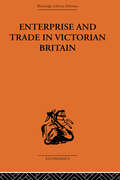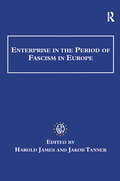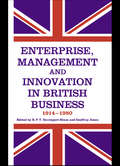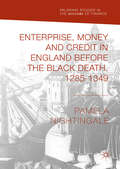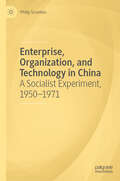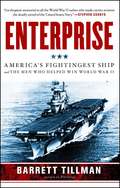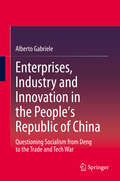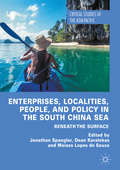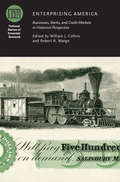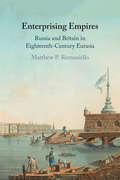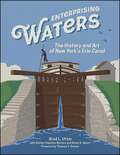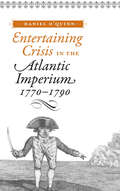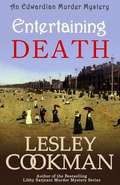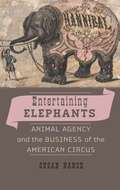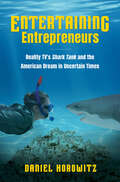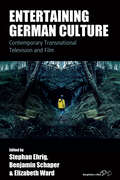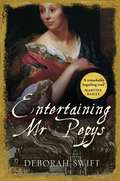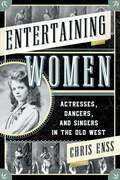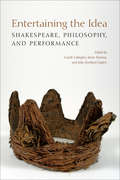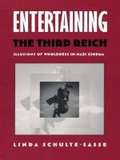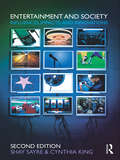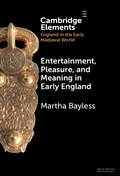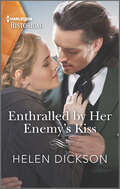- Table View
- List View
Enterprise Denied: Origins of the Decline of American Railroads, 1897-1917
by Albro MartinA 1971 piece that explores the struggle of the American Railroads in the early twentieth century.
Enterprise and Trade in Victorian Britain: Essays in Historical Economics
by D. N. McCloskeyThe essays in this book focus on the controversies concerning Britain's economic performance between the mid-nineteenth century and the First World War. The overriding theme is that Britain's own resources were consistently more productive, more resilient and more successful than is normally assumed. And if the economy's achievement was considerable, the influence on it of external factors (trade, international competition, policy) were much less significant than is normally supposed. The book is structured as follows: Part One: The Method of Historical Economics Part Two: Enterprise in Late Victorian Britain Part Three: Britain in the World Economy, 1846-1913.
Enterprise in the Period of Fascism in Europe (Studies in Banking and Financial History)
by Harold James Jakob TannerThe essays in this volume consider the involvement of business corporations and of individual businessmen in the politics of the 1930s and 1940s: in the move away from the market and also from democracy, towards state control and authoritarianism, including the massive intervention of the state in property rights. How far did businesses attempt to guide this intervention for their own purposes, and to what extent did they succeed? This debate deals, centrally, with the role of German business, of banks, of industrial corporations, and of small tradesmen in the Nazi regime. An older discussion of how they may have facilitated the Nazi takeover has been supplemented here by an investigation into how they made the regime’s policies possible, and the extent to which the profit motive drove them to participate - with sometimes more, sometimes less enthusiasm - in the politics of inhumanity. Such discussion has been given further impetus by legal action, initially in the United States, in the form of class action suits on behalf of the victims of Nazism. What do such legal and political debates mean for business history? What are the current responsibilities of business facing the consequences of historical action? And what lessons should be learned concerning the ethics of business behaviour? The contributions to this volume were originally presented as papers at a conference organised by the Society for European Business History in Paris in November 1998.
Enterprise, Management and Innovation in British Business, 1914-80
by Geoffrey Jones R.P.T. Davenport-HinesThis title available in eBook format. Click here for more information.Visit our eBookstore at: www.ebookstore.tandf.co.uk.
Enterprise, Money and Credit in England before the Black Death 1285–1349 (Palgrave Studies in the History of Finance)
by Pamela NightingaleThis book charts the contributions made to the development of the late medieval English economy by enterprise, money, and credit in a period which saw its major export trade in wool, which earned most of its money-supply, suffer from prolonged periods of warfare, high taxation, adverse weather, and mortality of sheep. Consequently, the economy suffered from severe shortages of coin, as well as from internal political conflicts, before the plague of 1348-9 halved the population. The book examines from the Statute Merchant certificates of debt, the extent to which credit, which normally reflects economic activity, was affected by these events, and the extent to which London, and the leading counties were affected differently by them. The analysis covers the entire kingdom, decade by decade, and thereby contributes to the controversy whether over-population or shortage of coin most inhibited its development.
Enterprise, Organization, and Technology in China: A Socialist Experiment, 1950-1971
by Philip ScrantonGiven the near-silence in technological and business history about post-World War II socialist enterprises, this book gives voice to a generation of Communist China’s managers, entrepreneurs, cadres, and workers from the Liberation to the early 1970s. Using recently-opened online archival resources, it details and assesses the course of technical and organizational experimentation at state-owned, cooperative, and private enterprises as the PRC strove to construct a socialist economy through trial-and-error initiatives. Core questions treated are: How did Chinese enterprises operate, evolve, experiment, improvise and adjust during the PRC’s first generation? What technological initiatives were crucial to these processes, necessarily developed with limited expertise and thin financial resources? How could constructing “socialism with Chinese characteristics” have helped lay foundations for the post-1980 “Chinese miracle,” as the PRC confidently entered the 21st century while Soviet and Central European socialisms crumbled? And what might current-day Western managers and entrepreneurs learn from Chinese practice and performance a half-century ago? Readers can anticipate a granular, bottom-up analysis of how businesses worked day-to-day in a planned economy, how enterprise practices and technological strategies shifted during the first postwar generation, how managers and technicians emerged after the capitalist exodus, how organizations experimented and adapted, and how the controversies and convulsions of the PRC’s early decades fashioned durable technical and organizational capabilities.
Enterprise: America's Fightingest Ship and the Men Who Helped Win World War II
by Barrett TillmanThis is the epic and heroic story of the aircraft carrier USS Enterprise and of the courageous men who fought and died on her from Pearl Harbor to the end of the conflict. Acclaimed military historian Barrett Tillman recounts the World War II exploits of America’s most decorated warship and its colorful crews— tales of unmatched daring and heroism.
Enterprises, Industry and Innovation in the People's Republic of China: Questioning Socialism from Deng to the Trade and Tech War
by Alberto GabrieleThis book analyses and critically evaluates the development of two key components of China’s economy: the network of productive enterprises, and the national innovation system, from the inception of market-oriented reforms to the present day. The approach is a partly novel one, albeit inspired to classical political economy, rooted in the structure and evolution of social relations of production and exchange and of the institutional setting in these two crucial domains. The main findings are twofold: First, the role of planning and public ownership, far from withering, has being upheld and qualitatively enhanced, especially throughout the most recent stages of industrial reforms. Second, enterprises are increasingly participating - along with universities and research centers - in a concerted and historically unparalleled effort to dramatically upgrade China’s capacity to engage in indigenous innovation. As a result, China’s National Innovation System has been growing and strengthening at a pace much faster than that of the national economy as a whole. The book also presents a speculative and provisional perspective on the validity, and meaning, of the claim that the country’s socioeconomic system is indeed a form of socialism with Chinese characteristics. It will be on interest to students and scholars researching China, politics, and development economics.
Enterprises, Localities, People, and Policy in the South China Sea
by Jonathan Spangler Dean Karalekas Moises Lopes de SouzaThis volume takes readers beneath the surface of the South China Sea by exploring critical but under-researched issues related to the maritime territorial disputes. It draws attention to the importance of private sector, civil society, and subnational actors' roles in the disputes and sheds light on key policy issues that are addressed less often in the literature. By going beyond mainstream analyses focused solely on issues of traditional security, resource economics, and international law, it offers a fresh and engaging look at the South China Sea disputes. The book is divided into five parts - historical foundations, enterprises, localities, people, and policy - and its chapters investigate historiography in the region, the global defense industry's role as beneficiary of the disputes, tourism as a territorial strategy, the roles of provinces and local governments, disaster management, confidence-building measures, environmental and science diplomacy, and other topics seldom discussed in other analyses of the South China Sea disputes. The book's diverse content and fresh perspectives make it an essential read not only for policymakers and those in the international relations community but also for all others interested in gaining a more well-rounded understanding of the many issues at stake in the South China Sea maritime territorial disputes.
Enterprising America
by Robert A. Margo William J. CollinsThe rise of America from a colonial outpost to one of the world's most sophisticated and productive economies was facilitated by the establishment of a variety of economic enterprises pursued within the framework of laws and institutions that set the rules for their organization and operation. To better understand the historical processes central to American economic development, Enterprising America brings together contributors who address the economic behavior of American firms and financial institutions--and the associated legal institutions that shaped their behavior--throughout the nineteenth and early twentieth centuries. Collectively, the contributions provide an account of the ways in which businesses, banks, and credit markets promoted America's extraordinary economic growth. Among the topics that emerge are the rise of incorporation and its connection to factory production in manufacturing, the organization and operation of large cotton plantations in comparison with factories, the regulation and governance of banks, the transportation revolution's influence on bank stability and survival, and the emergence of long-distance credit in the context of an economy that was growing rapidly and becoming increasingly integrated across space.
Enterprising Empires: Russia and Britain in Eighteenth-Century Eurasia
by Matthew P. RomanielloCommercial competition between Britain and Russia became entangled during the eighteenth century in Iran, the Middle East, and China, and disputes emerged over control of the North Pacific. Focusing on the British Russia Company, Matthew P. Romaniello charts the ways in which the company navigated these commercial and diplomatic frontiers. He reveals how geopolitical developments affected trade far more than commercial regulations while also challenging depictions of this period as a straightforward era of Russian economic decline. By looking at merchants' and diplomats' correspondence and the actions and experiences of men working in Eurasia for Russia and Britain, he demonstrates the importance of restoring human experiences in global processes and provides individual perspective on this game of empire. This approach reveals that economic fears, more than commodities exchanged, motivated actions across the geopolitical landscape of Europe during the Seven Years' War and the American and French Revolutions.
Enterprising Waters: The History and Art of New York's Erie Canal (Excelsior Editions)
by Brad L. UtterOne of the largest public works projects in American history, the Erie Canal inspired a nationwide transportation revolution and directed the course of New York and American history. When completed in 1825, the engineering marvel unlocked the Western interior for trade and settlement, boomtowns sprang up along the canal's path, and New York City grew to be the nation's most powerful center of international trade. Millions of people poured into New York (and some through it) to take advantage of the tremendous opportunities provided by the canal, influencing settlement and the social, political, and commercial landscapes of America.Produced in honor of the bicentennial of the beginning of construction of the canal, Enterprising Waters—a companion catalog to the New York State Museum's exhibition of the same name—includes reproductions of objects and images from the collections of more than thirty-five different institutions and individual lenders. It also contains reproductions of fifty-nine works of art used in the companion exhibition "Art of the Erie Canal." Themes of politics, engineering, commerce, life on the canal, and more are paired with full color images of artifacts, documents, and images to bring this unique American story to life, from its inception to today.
Entertaining Crisis in the Atlantic Imperium, 1770–1790
by Daniel O'QuinnHonorable Mention, 2012 Joe A. Callaway Prize in Drama and TheaterFirst Place, Large Not-for-Profit Publisher, Typographic Cover, 2011 Washington Book Publishers Design and Effectiveness AwardsLess than twenty years after asserting global dominance in the Seven Years' War, Britain suffered a devastating defeat when it lost the American colonies. Daniel O'Quinn explores how the theaters and the newspapers worked in concert to mediate the events of the American war for British audiences and how these convergent media attempted to articulate a post-American future for British imperial society.Building on the methodological innovations of his 2005 publication Staging Governance: Theatrical Imperialism in London, 1770-1800, O’Quinn demonstrates how the reconstitution of British imperial subjectivities involved an almost nightly engagement with a rich entertainment culture that necessarily incorporated information circulated in the daily press. Each chapter investigates different moments in the American crisis through the analysis of scenes of social and theatrical performance and through careful readings of works by figures such as Richard Brinsley Sheridan, William Cowper, Hannah More, Arthur Murphy, Hannah Cowley, George Colman, and Georg Friedrich Handel. Through a close engagement with this diverse entertainment archive, O'Quinn traces the hollowing out of elite British masculinity during the 1770s and examines the resulting strategies for reconfiguring ideas of gender, sexuality, and sociability that would stabilize national and imperial relations in the 1780s. Together, O'Quinn's two books offer a dramatic account of the global shifts in British imperial culture that will be of interest to scholars in theater and performance studies, eighteenth-century studies, Romanticism, and trans-Atlantic studies.
Entertaining Death: The Alexandrians Series Book Two
by Lesley CookmanThe second instalment in the Alexandrians series of mysteries set in Edwardian-era Kent by popular crime novelist Lesley Cookman.
Entertaining Elephants: Animal Agency and the Business of the American Circus (Animals, History, Culture)
by Susan NanceHow the lives and labors of nineteenth-century circus elephants shaped the entertainment industry.Consider the career of an enduring if controversial icon of American entertainment: the genial circus elephant. In Entertaining Elephants Susan Nance examines elephant behavior—drawing on the scientific literature of animal cognition, learning, and communications—to offer a study of elephants as actors (rather than objects) in American circus entertainment between 1800 and 1940. By developing a deeper understanding of animal behavior, Nance asserts, we can more fully explain the common history of all species.Entertaining Elephants is the first account that uses research on animal welfare, health, and cognition to interpret the historical record, examining how both circus people and elephants struggled behind the scenes to meet the profit necessities of the entertainment business. The book does not claim that elephants understood, endorsed, or resisted the world of show business as a human cultural or business practice, but it does speak of elephants rejecting the conditions of their experience. They lived in a kind of parallel reality in the circus, one that was defined by their interactions with people, other elephants, horses, bull hooks, hay, and the weather. Nance’s study informs and complicates contemporary debates over human interactions with animals in entertainment and beyond, questioning the idea of human control over animals and people's claims to speak for them. As sentient beings, these elephants exercised agency, but they had no way of understanding the human cultures that created their captivity, and they obviously had no claim on (human) social and political power. They often lived lives of apparent desperation.
Entertaining Entrepreneurs: Reality TV's Shark Tank and the American Dream in Uncertain Times
by Daniel HorowitzThe Great Recession threatened the well-being of tens of millions of Americans, dramatically weakened the working class, hollowed out the middle class, and strengthened the position of the very wealthy. Against this backdrop, the hit reality show Shark Tank premiered in 2009. Featuring ambitious entrepreneurs chasing support from celebrity investors, the show offered a version of the American Dream that still seemed possible to many, where a bright idea and a well-honed pitch could lift a bootstrap business to new heights of success. More than a decade later, Shark Tank still airs regularly on multiple networks, and its formula has sparked imitators everywhere, from elite universities to elementary school classrooms. In Entertaining Entrepreneurs, Daniel Horowitz shows how Shark Tank's version of entrepreneurship disguises and distorts the opportunities and traps of capitalism. Digging into today's cult of the entrepreneur, Horowitz charts its rise from the rubble of economic crisis and its spread as a mainstay of American culture, and he explores its flawed view of what it really takes to succeed in business. Horowitz offers more than a look at one television phenomenon. He is the perfect guide to the portrayal of entrepreneurship in business school courses, pitch competitions, popular how-to books, and scholarly works, as well as the views of real-world venture capitalists.
Entertaining German Culture: Contemporary Transnational Television and Film (Film Europa #27)
by Elizabeth Ward Stephan Ehrig, Benjamin SchaperAudiences for contemporary German film and television are becoming increasingly transnational, and depictions of German cultural history are moving beyond the typical post-war focus on Germany’s problematic past. Entertaining German Culture explores this radical shift, building on recent research into transnational culture to argue that a new process of internal and external cultural reabsorption is taking place through areas of mutually assimilating cultural exchange such as streaming services, an increasingly international film market, and the import and export of Anglo-American media formats.
Entertaining Mr Pepys: A thrilling, sweeping historical page-turner (The\women Of Pepys' Diary Ser. #3)
by Deborah SwiftPerfect for fans of Philippa Gregory, Alison Weir, Anne O'Brien and Elizabeth Chadwick, Deborah Swift brings a unique period in history to vivid, fascinating life in her acclaimed Pepys trilogy.'A remarkably beguiling read. It transported me to the glitter and filth of seventeenth century London' Martine Bailey, author of The Almanack'The fusion of historical facts and fiction is so flawless that it is hard to know where reality ends and fiction begins' Readers' FavoriteLondon, 1666. Elizabeth 'Bird' Carpenter has a wonderful singing voice, and music is her chief passion. When her father persuades her to marry horse-dealer Christopher Knepp, she suspects she is marrying beneath her station, but nothing prepares her for the reality of life with Knepp. Her father has betrayed her trust, for Knepp cares only for his horses; he is a tyrant and a bully, and will allow Bird no life of her own.When Knepp goes away, she grasps her chance and, encouraged by her maidservant Livvy, makes a secret visit to the theatre. Entranced by the music, the glitter and glamour of the surroundings, and the free and outspoken manner of the women on the stage, she falls in love with the theatre and is determined to forge a path of her own as an actress.But life in the theatre was never going to be straightforward - for a jealous rival wants to spoil her plans, and worse, Knepp forbids it, and Bird must use all her wit and intelligence to change his mind.Based on events depicted in the famous Diary of Samuel Pepys, Entertaining Mr Pepys brings London in the 17th Century to life. It includes the vibrant characters of the day such as the diarist himself and actress Nell Gwynne, and features a dazzling and gripping finale during the Great Fire Of London.The third in Deborah Swift's atmospheric trilogy, bringing to life the women in Pepys' Diary. Each novel features a different character and can be read as a standalone book.PRAISE FOR THE PEPYS TRILOGY:'Swift is a consummate historical novelist, basing her books on immaculate research and then filling the gaps between real events and real people with eloquent storytelling, atmospheric scene setting and imaginative plot lines' The Visitor'A novel that transports readers with astonishing and engrossing detail' Readers' Favorite 5*'Pepys and his world spring to vibrant life... Gripping, revealing and stunningly imagined' Lancashire Evening Post
Entertaining Mr Pepys: A thrilling, sweeping historical page-turner (Women Of Pepys' Diary Series #3)
by Deborah SwiftPerfect for fans of Philippa Gregory, Alison Weir, Anne O'Brien and Elizabeth Chadwick, Deborah Swift brings a unique period in history to vivid, fascinating life in her acclaimed Pepys trilogy.'A remarkably beguiling read. It transported me to the glitter and filth of seventeenth century London' Martine Bailey, author of The Almanack'The fusion of historical facts and fiction is so flawless that it is hard to know where reality ends and fiction begins' Readers' FavoriteLondon, 1666. Elizabeth 'Bird' Carpenter has a wonderful singing voice, and music is her chief passion. When her father persuades her to marry horse-dealer Christopher Knepp, she suspects she is marrying beneath her station, but nothing prepares her for the reality of life with Knepp. Her father has betrayed her trust, for Knepp cares only for his horses; he is a tyrant and a bully, and will allow Bird no life of her own.When Knepp goes away, she grasps her chance and, encouraged by her maidservant Livvy, makes a secret visit to the theatre. Entranced by the music, the glitter and glamour of the surroundings, and the free and outspoken manner of the women on the stage, she falls in love with the theatre and is determined to forge a path of her own as an actress.But life in the theatre was never going to be straightforward - for a jealous rival wants to spoil her plans, and worse, Knepp forbids it, and Bird must use all her wit and intelligence to change his mind.Based on events depicted in the famous Diary of Samuel Pepys, Entertaining Mr Pepys brings London in the 17th Century to life. It includes the vibrant characters of the day such as the diarist himself and actress Nell Gwynne, and features a dazzling and gripping finale during the Great Fire Of London.The third in Deborah Swift's atmospheric trilogy, bringing to life the women in Pepys' Diary. Each novel features a different character and can be read as a standalone book.PRAISE FOR THE PEPYS TRILOGY:'Swift is a consummate historical novelist, basing her books on immaculate research and then filling the gaps between real events and real people with eloquent storytelling, atmospheric scene setting and imaginative plot lines' The Visitor'A novel that transports readers with astonishing and engrossing detail' Readers' Favorite 5*'Pepys and his world spring to vibrant life... Gripping, revealing and stunningly imagined' Lancashire Evening Post
Entertaining Women: Actresses, Dancers, and Singers in the Old West
by Chris EnssThis collection of short stories of the women who entertained the West in makeshift theaters and palaces built to showcase the divas who were beloved by emigrants to the &“uncivilized&” West will feature well-known and lesser known dancers, singers, and actresses and their exploits. Author Chris Enss will bring her comedic timing and long experience writing about the time and culture of the West to this collection.
Entertaining the Idea: Shakespeare, Performance, and Philosophy (UCLA Clark Memorial Library Series)
To entertain an idea is to take it in, pay attention to it, give it breathing room, dwell with it for a time. The practice of entertaining ideas suggests rumination and meditation, inviting us to think of philosophy as a form of hospitality and a kind of mental theatre. In this collection, organized around key words shared by philosophy and performance, the editors suggest that Shakespeare’s plays supply readers, listeners, viewers, and performers with equipment for living. In plays ranging from A Midsummer Night’s Dream to King Lear and The Winter’s Tale, Shakespeare invites readers and audiences to be more responsive to the texture and meaning of daily encounters, whether in the intimacies of love, the demands of social and political life, or moments of ethical decision. Entertaining the Idea features established and emerging scholars, addressing key words such as role play, acknowledgment, judgment, and entertainment as well as curse and care. The volume also includes longer essays on Shakespeare, Kant, Husserl, and Hegel as well as an afterword by theatre critic Charles McNulty on the philosophy and performance history of King Lear.
Entertaining the Third Reich: Illusions of Wholeness in Nazi Cinema
by Linda Schulte-SasseIn this persuasive reversal of previous scholarship, Linda Schulte-Sasse takes an unorthodox look at Nazi cinema, examining Nazi films as movies that contain propaganda rather than as propaganda vehicles that happen to be movies. Like other Nazi artistic productions, Nazi film has long been regarded as kitsch rather than art, and therefore unworthy of critical textual analysis. By reading these films as consumer entertainment, Schulte-Sasse reveals the similarities between Nazi commercial film and classical Hollywood cinema and, with this shift in emphasis, demonstrates how Hollywood-style movie formulas frequently compromised Nazi messages.Drawing on theoretical work, particularly that of Lacan and Zizek, Schulte-Sasse shows how films such as Jew Süsss and The Great King construct fantasies of social harmony, often through distorted versions of familiar stories from eighteenth-century German literature, history, and philosophy. Schulte-Sasse observes, for example, that Nazi films, with their valorization of bourgeois culture and use of familiar narrative models, display a curious affinity with the world of Enlightenment culture that the politics of National Socialism would seem to contradict.Schulte-Sasse argues that film served National Socialism less because of its ideological homogeneity than because of the appeal and familiarity of its underlying literary paradigms and because the medium itself guarantees a pleasurable illusion of wholeness. Entertaining the Third Reich will be of interest to a wide range of scholars, including those engaged in the study of cinema, popular culture, Nazism and Nazi art, the workings of fascist culture, and the history of modern ideology.
Entertainment and Society: Influences, Impacts, and Innovations
by Shay Sayre Cynthia KingThe second edition of this innovative textbook introduces students to the ways that society shapes our many forms of entertainment and in turn, how entertainment shapes society. Entertainment and Society examines a broad range of types of entertainment that we enjoy in our daily lives – covering new areas like sports, video games, gambling, theme parks, travel, and shopping, as well as traditional entertainment media such as film, television, and print. A primary emphasis is placed on the impact of technological and cultural convergence on innovation and the influence of contemporary entertainment. The authors begin with a general overview of the study of entertainment, introducing readers to various ways of understanding leisure and play, and then go on to trace a brief history of the development of entertainment from its live forms through mediated technology. Subsequent chapters review a broad range of theories and research and provide focused discussions of the relationship between entertainment and key societal factors including economics and commerce, culture, law, politics, ethics, advocacy and technology. The authors conclude by highlighting innovations and emerging trends in live and mediated entertainment and exploring their implications for the future. The new edition features updated examples and pedagogical features throughout including text boxes, case studies, student activities, questions for discussion, and suggestions for further reading.
Entertainment, Pleasure, and Meaning in Early England (Elements in England in the Early Medieval World)
by Martha BaylessThe people of early England (c. 450–1100 CE) enjoyed numerous kinds of entertainment, recreation and pleasure, but the scattered records of such things have made the larger picture challenging to assemble. This volume illuminates the merrier aspects of early English life, extending our understanding of the full range of early medieval English culture. It shows why entertainment and festivity were not merely trivial aspects of culture, but had important functions, in ritual, in community-building, in assuming power, and in resistance to power. Among the activities explored are child's play; drinking and feasting; music, dance, and performance; the pleasures of literature, festivals and celebrations; hunting and sport; and games.
Enthralled by Her Enemy's Kiss
by Helen DicksonFrom feuding families…To an unlikely alliance? Jane Deighton&’s sister has eloped with the son of her family&’s sworn enemy! Determined to retrieve her at all costs, Jane is even willing to ask the man&’s formidable older brother, Lord Francis Randolph, for help. On their journey to find the runaways, Jane and Francis reluctantly start gravitating toward one another—culminating in one sinful kiss! Their families have been feuding for years, yet Jane can&’t help herself from being drawn to Francis&’s forbidden touch…From Harlequin Historical: Your romantic escape to the past.

